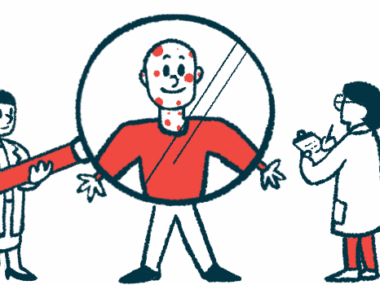Digital app for patient monitoring found helpful in small study
Fabry App includes a symptom tracker, medicine recording function
Written by |

A smartphone app, called Fabry App, for remotely assessing Fabry disease was found by patients to be helpful for tracking day-to-day fluctuations in symptoms, while their doctors found it easier to monitor them and identify needs for intervention, a small study conducted in the U.K. shows.
“A well-designed app can empower Fabry disease patients and help the clinician to closely monitor changes of their symptoms,” the researchers wrote in “Fabry App: the value of a portable technology in recording day-to-day patient monitored information in patients with Fabry disease,” which was published in the Orphanet Journal of Rare Diseases. “Our ultimate objective is to improve the clinical outcomes for Fabry disease patients by providing greater quality of care and, most importantly, by empowering patients to take charge of their own health.”
Fabry disease features a wide range of symptoms that vary in severity, including nerve pain, excessive sweating, gastrointestinal (GI) issues, kidney and heart problems.
As with many chronic diseases, people with Fabry usually go to a clinic once or twice a year for routine disease monitoring. These infrequent visits mean it can be difficult to get an accurate and detailed picture of the disease’s symptoms and their impacts on daily life, however.
Digital tools that use smartphones or other mobile devices are increasingly being developed to enable more frequent and remote data collection with chronic conditions. This can let patients and their doctors see day to day changes in their condition and make more specific treatment decisions.
Fabry App was developed in collaboration with Health Touch. The app includes a symptom tracker that uses standard clinical questionnaires to evaluate common symptoms. Patients can also record their medication use and leave detailed notes for their doctors. The information provided by the patient is sent to a secure website where clinicians can review it. Clinicians can also send patients messages and reminders.
Patient monitoring with smartphone app
Here, the researchers described findings from a feasibility study where they assessed whether patients seen at a center in London would engage well with the Fabry App.
Of 139 patients who had pain and/or GI symptoms who were invited to participate, 67 downloaded the app and used it at least once. Between May 2018 and December 2022, patients submitted a median of six entries, with an overall monthly usage of two entries.
People with classic Fabry disease, which typically is more severe and has an earlier onset, used the app more often than those with late-onset disease, which tends to have milder symptoms.
The app can monitor pain and GI symptoms, with classic patients having significantly greater hand and abdominal pain than late-onset patients.
Being able to record more detailed notes can help doctors better understand patient needs in the context of what is happening around them. For example, notes showed that, while COVID-19-related treatment interruptions didn’t lead to significant disease progression, many patients had elevated fatigue and diminished energy levels.
In general, patients found the app easy to use and accurate for tracking symptoms.
It was also helpful for consistently tracking symptom flares and triggers between appointments and patients agreed the app could be a resource for clinicians to collect more data.
“It’s a difficult disease and it is up and down,” one patient said. “Now I can meet with my consultant and we can look over the data together, and I can explain what was going on when my symptoms got worse.”
Clinicians felt the app aided better monitoring of’ symptoms and medication use, including those prescribed by another doctor.
The scientists said dedicated staff would be needed to review app data more regularly, and noted there was an apparent lack of motivation from less severely affected patients to participate.
The study, “supports the feasibility of a smartphone app to monitor Fabry disease,” wrote the researchers, who emphasized it’s solely meant to monitor subjective symptoms and life quality impacts, not vital signs or objective symptoms that may require urgent care.
Some funding for maintenance of the Fabry app comes through a grant from Amicus Therapeutics, which markets Galafold (migalastat).





